Cereals are hotting up as companies look to satisfy demand for a healthy breakfast option.
Health has been the number one topic for cereal manufacturers recently and it’s no surprise that health credentials feature heavily in their marketing campaigns. Packs are plastered with ‘less salt’, ‘less sugar’, ‘added value’ or ‘organic’.
Thanks to this trend, the hot cereal sector has enjoyed a fantastic year in 2005. Despite still being a relatively small sub-sector, its growth of 35% cannot be ignored (ACNielsen, November 2005)
Today’s Group trading controller Steve Hodson says: “The breakfast cereal market is reflecting the move towards healthy eating, with more wheat, wholegrain and oat products,” he says. “The acknowledged health benefits of both oats and wholegrain, combined with convenience, are the key drivers of hot cereals growth.”
One company benefiting from shoppers seeking out healthier options is Jordans. Marketing controller Carol Flint believes that while the market as a whole has been stable, there have been a number of shifts within it. “More and more people are moving away from everyday cereals and looking for a healthier option or cereals with added value,” says Flint.
“We have seen companies focus on existing brands and offering newer healthier variants. This has been successful to an extent but has not added massive value to the category. What it has done is maintained interest in the healthy option.”
Flint believes the ‘hots’ sector, into which Jordans recently introduced a new multigrain porridge, is set for further growth. She adds: “It’s true we’ve seen a lot of development in the hot cereals category. As a product, porridge is as old as the hills but innovation has made more people interested in it.”
Pepsi-Co has extended the number of products available in the hot cereals category with the development of its Quaker range. New lines include Take Heart - oats containing added ingredients to support heart health - organic oats and a new raspberry flavour in the Oatso Simple range. There are also plans to introduce a fresh ready-to-eat porridge in 2006.
PepsiCo trade marketing manager, Cara Beeby explains: “Consumers have become more mindful of health over the past year and this has had a positive impact on sales of healthier and hot cereals. The hot cereals category is continuing to grow faster than any other segment of the category and it is likely this trend will continue to grow as the focus on health continues.
“It’s important retailers remember that the hots market is seasonal and that sales really take off in September as autumn begins. Sales reach two peaks, pre- and post- Christmas, when consumers are feeling more wintry,” adds Beeby.
WINTER CHEER
Further developments in the hot cereals sector in 2005 were made by Weetabix, which introduced Ready Brek in an eight-sachet box. Other new products included Ready Brek Swirls, available in chocolate and strawberry flavours, and two new varieties - spiced apple & sultana and hearty - added to the Seriously Oaty range.
In another move, the company also launched Weetaflakes and Alpen No Added Sugar with apricots, dates and pistachios.
Weetabix chief executive Ken Wood comments: “Hot is the fastest-growing sector in the UK cereal market and with more than 1.3 million new households buying hot cereals this season through sachets, it is clear that convenience along with the health benefits of both oats and wholegrain are the key drivers of this growth.”
Kellogg’s is also quick to point to health as the key focus in the cereals market. January saw the company relaunch its ‘drop a jeans size’ promotion on Special K and introduce Special K Medley, an alternative to muesli, and Kashi Crunch, a seven-grain granola cereal with no added salt.
Kellogg’s UK sales director Jim McNeill says the c-store sector is of great importance to the company. “We have undertaken a great deal of research to develop insight into the convenience shopper,” says McNeill. “Kellogg’s has identified the taste and health segments as key opportunities for growth as these areas are already performing well in multiples.
“Retailers should also look to drive up average weight of purchase on all key SKUs by replacing with larger sizes, such as 500g instead of 375g to maximise category value growth.”
Under the umbrella of Cereal Partners UK (CPUK), Nestlé has been active in promoting health and, in particular, wholegrain on its packs. Last year it reduced sugar levels in five children’s cereals, including cutting sugar in Frosted Shreddies by 12%.
CPUK convenience and small basket stores business controller Graeme Foster explains: “Midway through 2005 Nestlé repackaged all brands to include on-pack wholegrain reference and guideline daily amounts of wholegrain, fats and sugars, plus calories per serve.”
He points out that the industry has been targeting health for a number of years. “The breakfast cereal industry reduced the salt content of their brands by 22% between 1998 and 2003, before government initiatives and media campaigns were devised,” says Foster.
CPUK has also developed the official licensed cereal for this year’s World Cup, Nestlé Football Crisp. Foster explains: “This is very much a one-off, to add a bit of excitement to the fixture. The main job for us in 2006 is focusing on a credible range in all stores.”
ONLT THE BEST WILL DO
Foster recommends that retailers keep a close eye on which products are selling well and then act on the trends. He adds: “Opportunities are often missed in smaller stores as the range is incomplete or focused on weaker sellers. There are many brands available but all retailers should stock the best-selling lines and offer customers choice and healthy attributes.
“Retailers should also include a hot oats and an instant oats cereal. Your customers will then reward you by making a convenience store purchase as opposed to a multiple purchase if the range includes the best-selling lines.”
As the debate on the nation’s diet continues, cereal manufacturers look likely to maintain their focus on health. By following the trend in-store yourself it’s likely to be your profits as well as your customers that benefit from the health-kick.
Retailer View
Andy Augla runs a 1,800sq ft Londis store in Bow, Tower Hamlets, with his wife Jas. With five 1.5 metre shelves dedicated to the category, the couple stock a wide range of cereals.
Mirroring industry figures Weetabix is their top seller, followed by Kellogg’s Cornflakes and Crunchy Nut Cornflakes. Nestlé’s Shredded Wheat breaks from the norm in fourth position as opposed to ninth in the overall market figures.
“The breakfast cereal category is very small compared with most and makes up only 0.8% of our sales, which is about £90 a week,” says Andy. “It’s the kind of thing customers expect us to stock and one of the vital ingredients for getting people to return to the store.
“As cereals are not often an impulse buy, we don’t give them a real prime spot, although they do have their own gondola. Customers can easily find them if that’s what they want to buy.
“I’ve certainly noticed an increase in the number of hot cereal products available and customers often buy the Oatso Simple packs. We obviously sell more of these products in the winter months.
“It’s definitely a category on which Londis carries promotions. We promoted Kellogg’s Crunchy Nut before Christmas and we’re now offering two packs of Special K for £3.80. We’re always keen to test out new products to see how they sell.
“Something we changed about a year ago was to double face some products and that has definitely helped boost sales.”
Sales tips
Allocate space according to the contribution of each segment to the category (for example, children’s cereals contribute about 29%).
Range the best-sellers from the segment in priority order.
Double-face best-sellers to improve stock replenishment and to simplify shelf presentation.
Feature best-sellers in the hot spot location on the fixture.
NPD makes up about 15% of category sales. List new products in prominent positions to encourage trial.
(Source: Kellogg’s)
Top 10 ready-to-eat cereals
Weetabix
Kellogg’s cornflakes
Kellogg’s crunchy nut cornflakes
Kellogg’s special k
Kellogg’s rice krispies
Nestle shreddies
Kellogg’s frosties
Nestle shredded wheat
Kellogg’s bran flakes
Nestle cheerios
IRI infoscan topline market data October 2005
What’s new?
Following on from Kashi original and Kashi honey, Kellogg’s has introduced Kashi muesli to its range. Kashi muesli is made with natural ingredients and a blend of seven whole grains, including barley, buckwheat and rye. A 375g pack has a rrp of £1.99. The New Year also saw the introduction of Kashi crunch - a granola cereal with seven whole grains, natural ingredients and no added salt.
Muesli producer Alara has developed a new range designed to meet the dietary requirements of three different age groups. The LifeStage Nutrition range, which contains organic fruit, seeds, nuts and cereals, offers three variants: growing years for children from two; blooming years for women aged 18-40; and prime years for consumers over 40.
Weetabix has introduced a honey flavour to its Weetos brand. The company believes the variant will be a popular choice with parents as it is the lowest-sugar product within the honey-flavoured cereals sector and because of the natural, healthy associations with honey. Weetos honey has a rrp of £2.49 and is available in packs of 500g.
Jordans recently launched a multigrain porridge - the first of its kind on the market. It’s a blend of four grains, oats, wheat, barley and rice, and contains about 40% less fat than normal porridge. It is available to retailers in 10x750g packs and has a rrp of £1.59.
The New Covent Garden Food Co. has launched a fresh porridge range. Available in four varieties - original, honey, maple syrup and citrus - the porridge comes in 200g single-serve pots as well as 500g sharing cartons.
Health has been the number one topic for cereal manufacturers recently and it’s no surprise that health credentials feature heavily in their marketing campaigns. Packs are plastered with ‘less salt’, ‘less sugar’, ‘added value’ or ‘organic’.
Thanks to this trend, the hot cereal sector has enjoyed a fantastic year in 2005. Despite still being a relatively small sub-sector, its growth of 35% cannot be ignored (ACNielsen, November 2005)
Today’s Group trading controller Steve Hodson says: “The breakfast cereal market is reflecting the move towards healthy eating, with more wheat, wholegrain and oat products,” he says. “The acknowledged health benefits of both oats and wholegrain, combined with convenience, are the key drivers of hot cereals growth.”
One company benefiting from shoppers seeking out healthier options is Jordans. Marketing controller Carol Flint believes that while the market as a whole has been stable, there have been a number of shifts within it. “More and more people are moving away from everyday cereals and looking for a healthier option or cereals with added value,” says Flint.
“We have seen companies focus on existing brands and offering newer healthier variants. This has been successful to an extent but has not added massive value to the category. What it has done is maintained interest in the healthy option.”
Flint believes the ‘hots’ sector, into which Jordans recently introduced a new multigrain porridge, is set for further growth. She adds: “It’s true we’ve seen a lot of development in the hot cereals category. As a product, porridge is as old as the hills but innovation has made more people interested in it.”
Pepsi-Co has extended the number of products available in the hot cereals category with the development of its Quaker range. New lines include Take Heart - oats containing added ingredients to support heart health - organic oats and a new raspberry flavour in the Oatso Simple range. There are also plans to introduce a fresh ready-to-eat porridge in 2006.
PepsiCo trade marketing manager, Cara Beeby explains: “Consumers have become more mindful of health over the past year and this has had a positive impact on sales of healthier and hot cereals. The hot cereals category is continuing to grow faster than any other segment of the category and it is likely this trend will continue to grow as the focus on health continues.
“It’s important retailers remember that the hots market is seasonal and that sales really take off in September as autumn begins. Sales reach two peaks, pre- and post- Christmas, when consumers are feeling more wintry,” adds Beeby.
WINTER CHEER
Further developments in the hot cereals sector in 2005 were made by Weetabix, which introduced Ready Brek in an eight-sachet box. Other new products included Ready Brek Swirls, available in chocolate and strawberry flavours, and two new varieties - spiced apple & sultana and hearty - added to the Seriously Oaty range.
In another move, the company also launched Weetaflakes and Alpen No Added Sugar with apricots, dates and pistachios.
Weetabix chief executive Ken Wood comments: “Hot is the fastest-growing sector in the UK cereal market and with more than 1.3 million new households buying hot cereals this season through sachets, it is clear that convenience along with the health benefits of both oats and wholegrain are the key drivers of this growth.”
Kellogg’s is also quick to point to health as the key focus in the cereals market. January saw the company relaunch its ‘drop a jeans size’ promotion on Special K and introduce Special K Medley, an alternative to muesli, and Kashi Crunch, a seven-grain granola cereal with no added salt.
Kellogg’s UK sales director Jim McNeill says the c-store sector is of great importance to the company. “We have undertaken a great deal of research to develop insight into the convenience shopper,” says McNeill. “Kellogg’s has identified the taste and health segments as key opportunities for growth as these areas are already performing well in multiples.
“Retailers should also look to drive up average weight of purchase on all key SKUs by replacing with larger sizes, such as 500g instead of 375g to maximise category value growth.”
Under the umbrella of Cereal Partners UK (CPUK), Nestlé has been active in promoting health and, in particular, wholegrain on its packs. Last year it reduced sugar levels in five children’s cereals, including cutting sugar in Frosted Shreddies by 12%.
CPUK convenience and small basket stores business controller Graeme Foster explains: “Midway through 2005 Nestlé repackaged all brands to include on-pack wholegrain reference and guideline daily amounts of wholegrain, fats and sugars, plus calories per serve.”
He points out that the industry has been targeting health for a number of years. “The breakfast cereal industry reduced the salt content of their brands by 22% between 1998 and 2003, before government initiatives and media campaigns were devised,” says Foster.
CPUK has also developed the official licensed cereal for this year’s World Cup, Nestlé Football Crisp. Foster explains: “This is very much a one-off, to add a bit of excitement to the fixture. The main job for us in 2006 is focusing on a credible range in all stores.”
ONLT THE BEST WILL DO
Foster recommends that retailers keep a close eye on which products are selling well and then act on the trends. He adds: “Opportunities are often missed in smaller stores as the range is incomplete or focused on weaker sellers. There are many brands available but all retailers should stock the best-selling lines and offer customers choice and healthy attributes.
“Retailers should also include a hot oats and an instant oats cereal. Your customers will then reward you by making a convenience store purchase as opposed to a multiple purchase if the range includes the best-selling lines.”
As the debate on the nation’s diet continues, cereal manufacturers look likely to maintain their focus on health. By following the trend in-store yourself it’s likely to be your profits as well as your customers that benefit from the health-kick.
Retailer View
Andy Augla runs a 1,800sq ft Londis store in Bow, Tower Hamlets, with his wife Jas. With five 1.5 metre shelves dedicated to the category, the couple stock a wide range of cereals.
Mirroring industry figures Weetabix is their top seller, followed by Kellogg’s Cornflakes and Crunchy Nut Cornflakes. Nestlé’s Shredded Wheat breaks from the norm in fourth position as opposed to ninth in the overall market figures.
“The breakfast cereal category is very small compared with most and makes up only 0.8% of our sales, which is about £90 a week,” says Andy. “It’s the kind of thing customers expect us to stock and one of the vital ingredients for getting people to return to the store.
“As cereals are not often an impulse buy, we don’t give them a real prime spot, although they do have their own gondola. Customers can easily find them if that’s what they want to buy.
“I’ve certainly noticed an increase in the number of hot cereal products available and customers often buy the Oatso Simple packs. We obviously sell more of these products in the winter months.
“It’s definitely a category on which Londis carries promotions. We promoted Kellogg’s Crunchy Nut before Christmas and we’re now offering two packs of Special K for £3.80. We’re always keen to test out new products to see how they sell.
“Something we changed about a year ago was to double face some products and that has definitely helped boost sales.”
Sales tips
Allocate space according to the contribution of each segment to the category (for example, children’s cereals contribute about 29%).
Range the best-sellers from the segment in priority order.
Double-face best-sellers to improve stock replenishment and to simplify shelf presentation.
Feature best-sellers in the hot spot location on the fixture.
NPD makes up about 15% of category sales. List new products in prominent positions to encourage trial.
(Source: Kellogg’s)
Top 10 ready-to-eat cereals
Weetabix
Kellogg’s cornflakes
Kellogg’s crunchy nut cornflakes
Kellogg’s special k
Kellogg’s rice krispies
Nestle shreddies
Kellogg’s frosties
Nestle shredded wheat
Kellogg’s bran flakes
Nestle cheerios
IRI infoscan topline market data October 2005
What’s new?
Following on from Kashi original and Kashi honey, Kellogg’s has introduced Kashi muesli to its range. Kashi muesli is made with natural ingredients and a blend of seven whole grains, including barley, buckwheat and rye. A 375g pack has a rrp of £1.99. The New Year also saw the introduction of Kashi crunch - a granola cereal with seven whole grains, natural ingredients and no added salt.
Muesli producer Alara has developed a new range designed to meet the dietary requirements of three different age groups. The LifeStage Nutrition range, which contains organic fruit, seeds, nuts and cereals, offers three variants: growing years for children from two; blooming years for women aged 18-40; and prime years for consumers over 40.
Weetabix has introduced a honey flavour to its Weetos brand. The company believes the variant will be a popular choice with parents as it is the lowest-sugar product within the honey-flavoured cereals sector and because of the natural, healthy associations with honey. Weetos honey has a rrp of £2.49 and is available in packs of 500g.
Jordans recently launched a multigrain porridge - the first of its kind on the market. It’s a blend of four grains, oats, wheat, barley and rice, and contains about 40% less fat than normal porridge. It is available to retailers in 10x750g packs and has a rrp of £1.59.
The New Covent Garden Food Co. has launched a fresh porridge range. Available in four varieties - original, honey, maple syrup and citrus - the porridge comes in 200g single-serve pots as well as 500g sharing cartons.



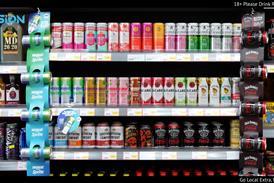
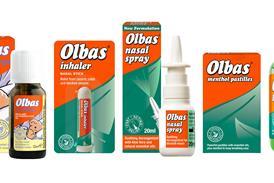



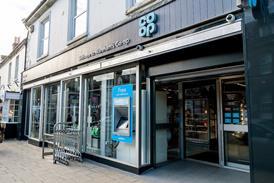
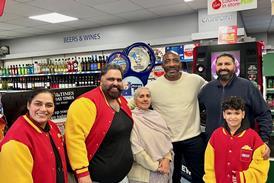








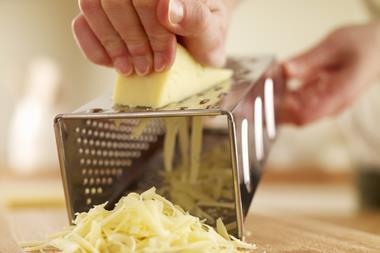

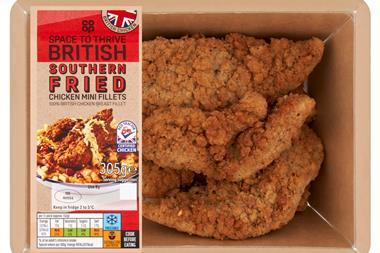

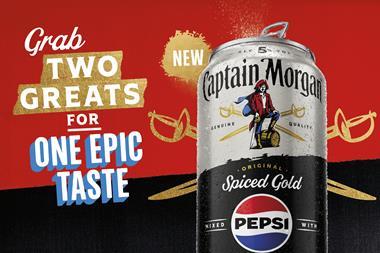
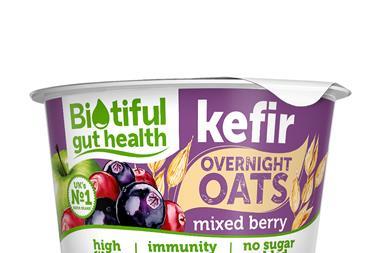
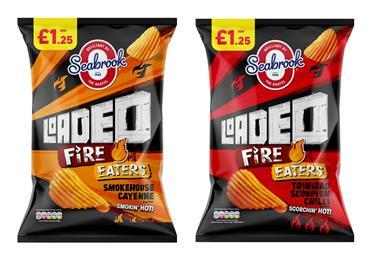
No comments yet